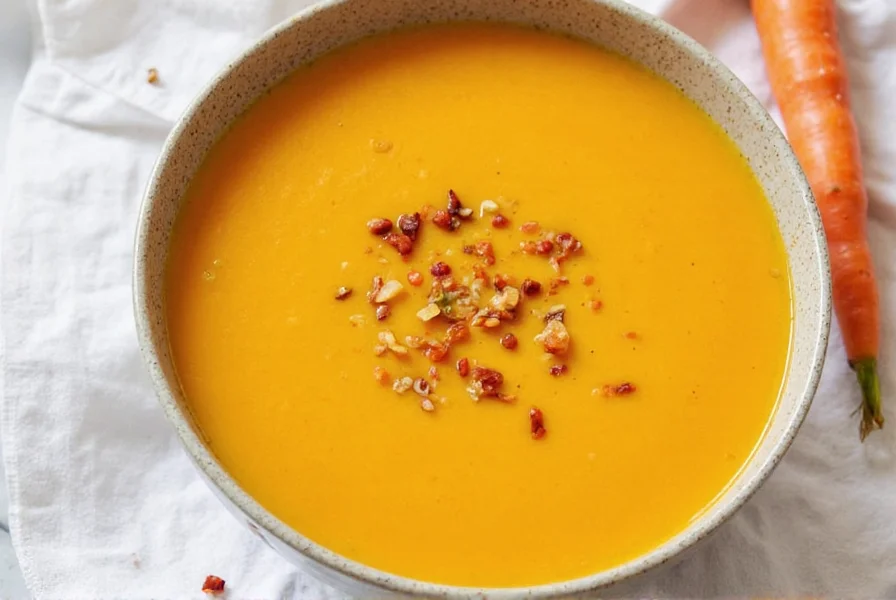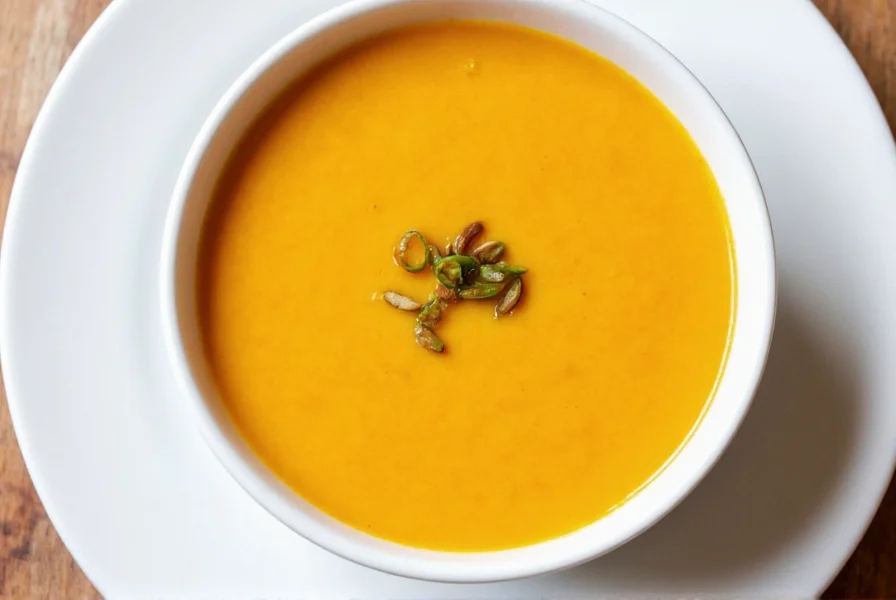Carrot ginger soup with coconut milk has become a staple in modern healthy cooking for good reason. This vibrant orange soup delivers a perfect harmony of sweet, spicy, and creamy elements that satisfy both your taste buds and nutritional needs. Unlike traditional cream-based soups, the coconut milk version provides a dairy-free alternative that's equally luxurious in texture but packed with additional health benefits.
The Perfect Flavor Combination Explained
Understanding why carrot, ginger, and coconut milk work so well together requires examining each component's culinary properties. Carrots bring natural sweetness and earthiness, containing beta-carotene that transforms into vitamin A during cooking. Fresh ginger contributes a spicy warmth with its active compound gingerol, known for anti-inflammatory properties. Coconut milk serves as the ideal bridge between these elements—its subtle sweetness complements the carrots while its creamy texture tames ginger's heat without masking it.
Professional chefs appreciate this combination because it creates what's called "flavor layering"—each ingredient enhances the others without any single component dominating. The soup achieves what culinary experts call "umami balance," where sweet, spicy, and savory elements create a more complex taste experience than any single ingredient could provide.
Nutritional Powerhouse Benefits
This easy carrot ginger soup with coconut milk recipe delivers impressive health benefits that extend beyond basic nutrition. The synergy between ingredients creates what nutritionists call a "food matrix"—where the combined effect exceeds the sum of individual components.
| Key Ingredient | Primary Nutrients | Health Benefits |
|---|---|---|
| Carrots | Beta-carotene, Vitamin A, Fiber | Boosts immunity, supports eye health, promotes skin healing |
| Fresh Ginger | Gingerol, Antioxidants | Reduces inflammation, aids digestion, may relieve nausea |
| Coconut Milk | Medium-chain triglycerides, Lauric acid | Supports heart health, provides sustained energy, enhances nutrient absorption |
The vitamin A from carrots becomes more bioavailable when combined with the healthy fats in coconut milk—a perfect example of nutrient synergy. This makes carrot ginger soup with coconut milk particularly valuable during cold and flu season, as the combination supports multiple aspects of immune function.
Authentic Carrot Ginger Soup with Coconut Milk Recipe
Creating the best carrot ginger soup with coconut milk requires attention to ingredient quality and technique. This tested recipe yields a perfectly balanced soup with velvety texture and complex flavor.
Ingredients
- 1.5 lbs (680g) carrots, peeled and chopped
- 2-inch piece fresh ginger, peeled and grated
- 1 medium yellow onion, diced
- 3 cloves garlic, minced
- 1 can (13.5 oz) full-fat coconut milk
- 4 cups vegetable broth (low sodium)
- 2 tbsp olive oil or coconut oil
- 1 tbsp fresh lime juice
- ½ tsp ground turmeric (optional)
- Salt and freshly ground black pepper to taste
Step-by-Step Preparation
- Sauté aromatics: Heat oil in a large pot over medium heat. Add onions and a pinch of salt, cooking until translucent (5-7 minutes). Add garlic and grated ginger, stirring constantly for 1 minute until fragrant.
- Add carrots: Stir in chopped carrots and turmeric (if using), cooking for 2 minutes to enhance flavor development.
- Simmer: Pour in vegetable broth, bring to a boil, then reduce heat to low. Cover and simmer for 20-25 minutes until carrots are fork-tender.
- Blend: Carefully transfer mixture to a blender (in batches if necessary), adding half the coconut milk. Blend until completely smooth. Caution: Hot liquids expand in blenders—leave space and cover with a towel.
- Finish: Return soup to pot, stir in remaining coconut milk and lime juice. Season with salt and pepper. Heat gently without boiling.

Pro Tips for Perfect Results Every Time
Professional chefs and experienced home cooks rely on these techniques to elevate their creamy carrot ginger soup with coconut milk:
- Ginger preparation: Freeze ginger before grating—it releases more juice and flavor compounds. Use the small holes on your grater for maximum surface area.
- Coconut milk selection: Always use full-fat canned coconut milk (not carton beverage) for proper creaminess. Shake well before opening as separation is natural.
- Texture control: For ultra-smooth soup, strain through a fine-mesh sieve after blending. For heartier texture, reserve some cooked carrots to blend separately and stir in at the end.
- Flavor development: Add a pinch of cayenne or red pepper flakes during cooking to enhance ginger's warmth without overwhelming heat.
- Acid balance: The lime juice is crucial—add it at the end to brighten flavors. Taste and adjust before serving.
Variations for Different Dietary Needs
This versatile carrot ginger soup with coconut milk adapts beautifully to various dietary preferences while maintaining its essential character:
- Vegan protein boost: Stir in ½ cup red lentils during simmering—they'll cook completely and add protein without altering flavor.
- Curry variation: Add 1-2 tsp curry powder with the ginger for an Indian-inspired twist that complements the coconut milk.
- Lower calorie option: Replace half the coconut milk with additional broth and add 1 tbsp chia seeds while blending for creaminess.
- Kid-friendly version: Reduce ginger to 1-inch piece and add 1 apple (peeled and chopped) with the carrots for natural sweetness.
- Immune-boosting upgrade: Add 1 tsp turmeric and a pinch of black pepper (enhances curcumin absorption) during cooking.
Serving and Storage Recommendations
How you serve carrot ginger soup with coconut milk significantly impacts the dining experience. For the best presentation and flavor:
- Chill your soup bowls before serving to maintain optimal temperature
- Garnish with fresh cilantro, a drizzle of coconut cream, and toasted coconut flakes
- Pair with crusty whole-grain bread or a simple green salad
- For special occasions, serve in small cups as an elegant starter
Proper storage ensures your healthy carrot ginger soup with coconut milk maintains quality:
- Refrigerate in airtight container for up to 4 days
- Freeze in portion-sized containers for up to 3 months (thaw overnight in refrigerator)
- When reheating, do so gently over medium-low heat—avoid boiling which can cause coconut milk to separate
- Stir in a splash of broth or coconut milk if soup thickens too much during storage

Why This Recipe Stands Out
Among the many carrot ginger soup with coconut milk recipes available, this version achieves the perfect balance that many others miss. Most recipes either overpower with ginger or create a soup that's too sweet. This method carefully controls the ginger-to-carrot ratio while using coconut milk's natural properties to create a soup that's simultaneously comforting and refreshing.
The technique of adding half the coconut milk before blending and half after creates a texture that's creamy without being heavy—a common pitfall in many dairy-free soups. The final touch of fresh lime juice activates all the flavors, making this more than just another healthy soup but a memorable culinary experience.
Can I make carrot ginger soup with coconut milk without a blender?
Yes, you can make carrot ginger soup with coconut milk without a blender by using an immersion blender directly in the pot. If you don't have either, cook the carrots until extremely tender (30-35 minutes), then mash thoroughly with a potato masher before adding the coconut milk. The texture will be slightly more rustic but still delicious.
Why does my carrot ginger soup with coconut milk separate when reheating?
Coconut milk can separate when exposed to high heat or rapid temperature changes. To prevent separation when reheating carrot ginger soup with coconut milk, warm it gently over medium-low heat while stirring frequently. Avoid boiling. If separation occurs, remove from heat and vigorously whisk in 1-2 teaspoons of cold water or additional coconut milk to re-emulsify the soup.
What's the best way to store leftover carrot ginger soup with coconut milk?
Store cooled carrot ginger soup with coconut milk in an airtight container in the refrigerator for up to 4 days. For longer storage, freeze in portion-sized containers for up to 3 months. When freezing, leave 1-inch of space at the top as the soup expands. Always thaw frozen soup overnight in the refrigerator before reheating gently on the stove.
Can I use coconut cream instead of coconut milk in this recipe?
Yes, you can use coconut cream instead of coconut milk for an even richer carrot ginger soup, but you'll need to dilute it with additional broth. Use a 1:1 ratio of coconut cream to broth instead of the full can of coconut milk. Coconut cream has a higher fat content, so you may want to reduce the cooking time slightly as it can become too thick.
How can I make my carrot ginger soup with coconut milk spicier without adding more ginger?
To increase the heat in your carrot ginger soup with coconut milk without adding more ginger, try incorporating ¼ teaspoon cayenne pepper, a few dashes of hot sauce, or a small minced red chili pepper when sautéing the aromatics. Black pepper also enhances the perception of heat. For a more complex spice profile, add a pinch of red pepper flakes along with ½ teaspoon smoked paprika during cooking.











 浙公网安备
33010002000092号
浙公网安备
33010002000092号 浙B2-20120091-4
浙B2-20120091-4